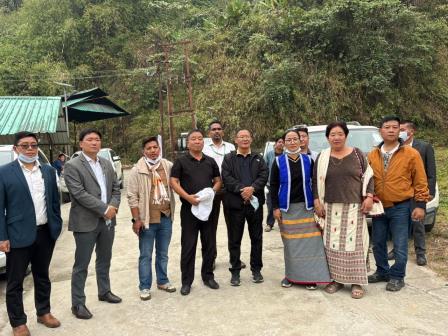-
COPU reviews state PSUs in second sitting
-
CM stresses on strong internal security, tech-driven policing
-
Cabinet approves proposals aimed at strengthening governance, enhancing public…
-
Body found hanging at bus stop with limbs tied sparks…
-
Mein chairs pre-budget consultative meeting with community based organisations
-
District level training on Census of India 2027 begins at…
-
WCD Minister reiterates commitment to safeguarding rights, dignity of…
-
Woman loses life in massive fire, two children seriously injured
-
 UA Minister inspects burial ground, focuses on maintenance and improvement
UA Minister inspects burial ground, focuses on maintenance and improvement
-
 UA Minister inspects burial ground, focuses on maintenance and improvement
UA Minister inspects burial ground, focuses on maintenance and improvement
Capital District administration has issued an order stating that from July 20 no fuel will be sold to two-wheeler riders riding without helmets at all petrol depots in the capital complex area. This was a long awaited administrative measure and although it seems a little harsh, it was absolutely necessary since data shows that number of road accidents involving two-wheeler riders without helmets are on a sharp rise.
Two-wheeler riders not wearing a helmet or their pillion(s) not caring to put helmets is a very common sight in almost any Indian thoroughfare whether in metros or cities or in rural areas. News of accidental deaths of two-wheeler riders not wearing helmets have become distressingly common and noticeably, almost all administrative mechanisms throughout the length and breadth of the country is finding increasingly difficult to tame this deadly ‘habit’. Despite provisions in law and sustained campaigns by the traffic police of the respective cities and towns, helmet rule violation has remained the most fined offence. In the nation’s capital Delhi over 11.93 lakh riders were prosecuted for riding without helmets in 2018 and that the prosecution route is a futile attempt of rectification is proven from the rising prosecution figure itself- when in 2016 it stood at over 9.88 lakh, in 2017 it was 11.02 lakh. Fines of a certain amount or even resorting to Gandhigiri by presenting roses to the non-helmet bikers instead of fines have proved to be little effective. It seems that the ‘charm’ of riding two-wheeler without helmets just to be a little more hedonistic has engulfed a large portion of citizens particularly the youth. And now with the urge of putting things to order, more and more traffic authorities are resorting to this ingenious idea of ‘no helmet, no fuel’. Andhra Pradesh has already implemented this on a pan-state basis along with many cities all over India.
With such ‘unfazed’ attitude displayed by the citizens, it is no wonder that India accounts for most of the world’s road accident related fatalities with 98 two-wheeler users without helmets losing their lives every day in 2017 alone. Although the total number of road accidents has declined from about 1.51 lakh in 2016 to 1.48 lakh in 2017, the number of deaths arising out of lack of safety gears like helmets had actually worsened from approximately above 10,000 cases in 2016 to nearly 36,000 in 2017.
In Arunachal, wearing helmets is more necessary as the roads frequently remain ‘inhospitable’ both due to man-made and nature induced reasons. It would be more welcoming if this justifiable action of ‘no helmet, no fuel’ is implemented on a pan-Arunachal basis under a strict and sustained monitoring radar.

Kenter Joya Riba
(Managing Editor)She is a graduate in Science with post graduation in Sociology from University of Pune. She has been in the media industry for nearly a decade. Before turning to print business, she has been associated with radio and television.
Email: kenterjoyaz@easternsentinel.in / editoreasternsentinel@gmail.com
Phone: 0360-2212313

